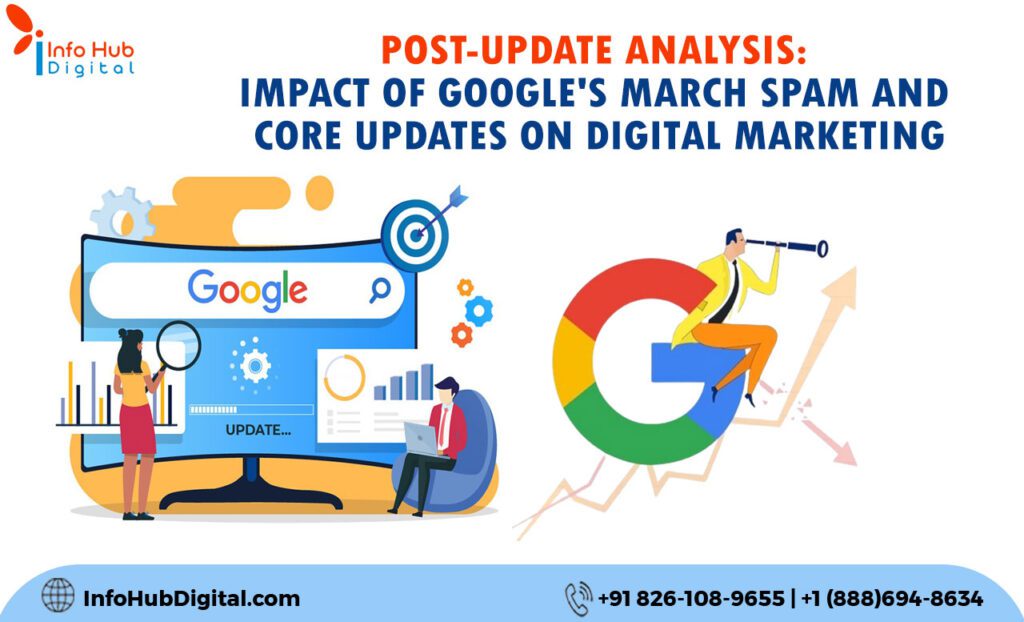Staying updated with search engine algorithm changes is essential for digital marketers. Google, as the leading search engine, frequently updates its algorithms to enhance search quality and user experience. In March, Google introduced both Spam and Core Updates, bringing significant changes to search rankings and digital marketing strategies. This blog post delves into the key changes brought about by these updates and discusses their implications for digital marketers.
Table of Contents
Understanding Google’s March Update
Before we delve into the impact, let’s briefly outline what these updates entail:
Spam Update: This update aims to further refine Google’s ability to identify and penalize spammy or low-quality content. Google has been increasingly focusing on providing users with high-quality, relevant search results, and this update is a step towards achieving that goal.
Core Update: Core updates are broader in scope and can impact how Google’s algorithm assesses website content, relevance, and authority. These updates can lead to significant fluctuations in search rankings and require digital marketers to reassess their SEO strategies.
Impact on Digital Marketing
1. Quality Over Quantity
With the Spam Update, Google has become even more adept at identifying and penalizing low-quality content. This means that digital marketers need to prioritize quality over quantity when creating content. Content should be well-researched, original, and provide genuine value to the target audience. Avoiding keyword stuffing, irrelevant backlinks, and other spammy tactics is crucial to maintaining and improving search rankings.
2. User Experience Matters
Google’s Core Update emphasizes the importance of user experience in determining search rankings. Websites that offer a seamless, intuitive, and engaging user experience are more likely to rank higher in search results. This includes fast loading times, mobile-friendliness, easy navigation, and high-quality content. Digital marketers should focus on optimizing website design and functionality to enhance user experience and improve search rankings.
3. E-A-T (Expertise, Authoritativeness, Trustworthiness)
Google’s Core Update places a strong emphasis on E-A-T, particularly for websites in the YMYL (Your Money or Your Life) category. Websites that demonstrate expertise, authoritativeness, and trustworthiness are more likely to rank higher in search results. Digital marketers should focus on building a strong brand reputation, showcasing expertise in their field, and establishing trust with their audience through transparent and credible content.
4. Adaptability and Continuous Learning
The digital marketing landscape is constantly evolving, and Google’s updates serve as a reminder of the importance of adaptability and continuous learning. Digital marketers should stay updated with the latest SEO trends, algorithm changes, and best practices to ensure their strategies remain effective and relevant. Investing in ongoing training, attending industry conferences, and networking with peers can help digital marketers stay ahead of the curve and adapt to changes more effectively.
Conclusion
Google’s March Spam and Core Updates have brought about significant changes in the digital marketing landscape. By prioritizing quality content, focusing on user experience, emphasizing E-A-T, and fostering adaptability and continuous learning, digital marketers can navigate these changes effectively and maintain or improve their search rankings. Staying updated with the latest SEO trends and algorithm changes is crucial for success in the dynamic world of digital marketing. As the digital landscape evolves, partnering with Info Hub Digital emerges as the definitive choice for businesses seeking unparalleled SEO expertise. As the best SEO service provider in India and US, Info Hub Digital offers tailored solutions that propel brands towards digital success. With a commitment to innovation and excellence, Info Hub Digital empowers businesses to thrive in the dynamic realm of AI-driven search.







